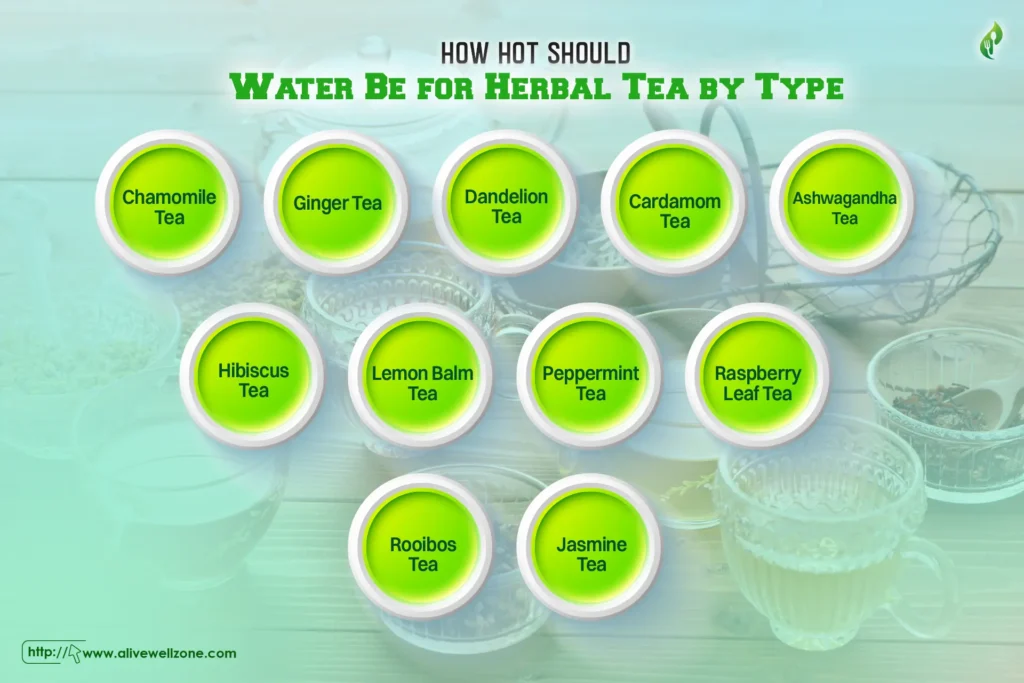Last Updated on May 21, 2025 by Helena Akter
Do you know how hot should water be for herbal tea? If you don’t, your tea might taste bad or be less healthy. That’s because the water temperature can affect the flavor and benefits of the tea.
So, the water for herbal tea should be between 200°F and 212°F, but specific herbs require different temperatures. Chamomile prefers 160°F, while ginger and peppermint need boiling water. Plus, proper water temperature helps release the best flavor without bitterness.
Later on, we’ll break down the ideal temperatures for different types of herbal tea. By the end, you’ll know exactly how to brew the perfect cup every time.
Key Takeaways
- Water temperature: Most herbal teas need water between 200°F and 212°F for the best flavor. However, sensitive herbs like chamomile benefit from slightly cooler water, around 160°F, to prevent bitterness.
- Each tea type is unique: Specific herbal teas, such as peppermint, ginger, and rooibos, thrive with boiling water. Meanwhile, others like chamomile and jasmine need lower temperatures for best results.
- Too much heat can ruin the taste: If you use boiling water to steep herbs, you can burn them, making the tea taste bitter. This is especially true for delicate teas like chamomile tea.
What Temperature Should Water Be for Herbal Tea?
Herbal teas typically need hotter water close to boiling around 200°F to 212°F (93°C to 100°C) to extract their flavors fully. Usually, most guidelines suggest using this temperature.
However, your exact preference may vary based on the type of herbs you’re brewing.
Teas made from herbs, unlike those made from tea leaves, don’t taste bitter even when you use very hot water. That’s because they don’t have tannins. If you think the taste is too strong, try using slightly cooler water.
To make the best herbal tea, you must find the right balance of flavor and smoothness. So, experiment with different temperatures to see what you like best.
Why Water Temperature is Important When Brewing Tea?
Water temperature plays a vital role in extracting the full flavor of tea. Different herbal teas require specific temperatures to bring out their best qualities. Keep in mind that brewing with water that’s too hot or too cold can ruin the taste.
Plus, overheating can “burn” delicate teas like white or green, extracting too many tannins and making the tea bitter. On the other hand, water that’s too cool can result in under-extraction. Therefore, you don’t get the health benefits of your herbal tea bland.
Besides, research shows that the temperature of the water used to brew tea can influence its taste and health benefits. Each tea type, whether herbal, green, black, or oolong, has an ideal brewing temperature to release its unique flavors.
How Hot Should Water Be for Herbal Tea by Type
Let’s now see the best water temperature for different types of herbal tea.

Water Temperature for Chamomile Tea
To get the best taste from chamomile tea, use water that’s about 160°F (70°C). Unlike other herbal teas that can be boiled, chamomile is sensitive and tastes better with slightly cooler water. If the water is too hot, the tea will be bitter.
But at 160°F, it’ll have a soothing, floral flavor.
Water Temperature for Ginger Tea
To make ginger tea that’s not bitter, heat the water until it reaches 212°F (100°C), the boiling point. In the case of French Lemon Ginger Blend, the required water temperature is 206°F. You can steep the ginger for 5-10 minutes.
Remember, if you boil it for too long, the tea will be too strong or bitter.
Water Temperature for Dandelion Tea
Dandelion tea has a naturally bitter taste, and boiling water can intensify that bitterness. Usually, you can go for water at around 80°C (175°F). If you have a thermometer, that’s ideal.
However, if not, you can heat the water until you see small bubbles forming at the bottom of the pot. Then, pour the water over the dried dandelion leaves.
Water Temperature for Cardamom Tea
Use fresh or filtered water and heat it until it reaches a full boil. Remember, the water should be around 212°F. You can do this with an electric kettle or on the stovetop.
Water Temperature for Ashwagandha Tea
To make Ashwagandha tea, heat water to 212°F (100°C). Add 1 teaspoon of the herb to 8 oz of hot water and let it steep for 3 to 7 minutes. You can brew it with either whole pieces of the herb or use it in powdered form.
Water Temperature for Hibiscus Tea
Hibiscus tea is typically steeped in water that has just reached boiling, similar to how you would prepare black tea or other herbal teas. The ideal temperature is between 200°F and 212°F.
If you don’t have a kettle with temperature settings, remember that water starts simmering at 190°F and boils at 212°F at sea level.
Water Temperature for Lemon Balm Tea
When preparing lemon balm tea, you should keep the water just below a full boil. It’s the point where a bubble starts forming but doesn’t vigorously boil. This gentle heat helps preserve the herb’s beneficial properties.
You can start by covering a generous handful of the leaves with hot water.
Water Temperature for Peppermint Tea
Peppermint herbal tea is best made using fully boiled water, around 212°F. If you want to mix peppermint with other tea, you can use the temperature guide for that tea.
Water Temperature for Raspberry Leaf Tea
To make raspberry leaf tea, boil water and let it cool slightly until it’s around 200°F (93°C). Unlike black tea, this tea stays a light color.
Put a tea bag in a cup and let it steep for about 10 minutes. Cover the cup to keep the tea warm. Steeping longer won’t make the tea stronger, but it might change the flavor.
Water Temperature for Rooibos Tea
To make a delicious cup of rooibos tea, use boiling water that is about 95°C to 100 °C. Rooibos can withstand high temperatures without getting bitter, so steep it for at least 10 minutes to release its full flavor.
If the tea tastes too weak, simply add more leaves!
Water Temperature for Jasmine Tea
To make jasmine green and jasmine white tea, use water that’s between 175°F and 180°F. For jasmine tea with a black or herbal base, use boiling water.
Final Words
In short, how hot should water be for herbal tea? The answer depends on the type of herb you’re using. Generally, most herbal teas need water close to boiling (200°F to 212°F).
However, more delicate herbs like chamomile prefer cooler temperatures (160°F). Now, don’t be afraid to experiment with different temperatures to find what works best for your taste.
You just need to pay attention to the water temperature to improve the flavor and benefits of your herbal tea.
FAQs
How long can tea sit at room temperature?
Tea can sit at room temperature for up to four hours before the flavor starts to fade. After that, it may taste dull or stale, especially if it has cooled. For the best experience, enjoy your tea while it’s still warm and fresh.
What if the water for my herbal tea is too hot?
If the water for your herbal tea is too hot, it can burn the tea leaves and extract bitter tannins, leading to a harsh taste. Using water that’s too hot will also ruin the delicate flavors, leaving you with an unbalanced and unpleasant brew.
What is the right Assam tea temperature?
The ideal temperature for brewing Assam tea is around 212°F (100°C), using freshly boiled water. This strong black tea benefits from the high heat to bring out its full-bodied, malty flavor.
References
- https://www.reddit.com/r/tea/comments/1bpzx3m/what_is_the_best_water_temperature_and_water_type/
- https://www.reddit.com/r/tea/comments/nnjjwi/for_anyone_that_needs_this_optimal_tea_brewing/
- https://www.kitchenaid.com/pinch-of-help/countertop-appliances/tea-temperatures.html
- https://artfultea.com/blogs/101/tea-brewing-temperature-guide
- https://www.quora.com/What-is-the-recommended-temperature-of-water-when-making-a-cup-of-black-tea-with-a-teabag
- https://rishi-tea.com/blogs/journal/why-water-temperature-is-important-when-brewing-tea

